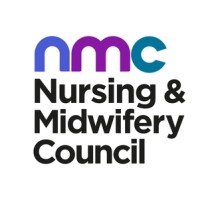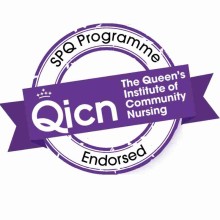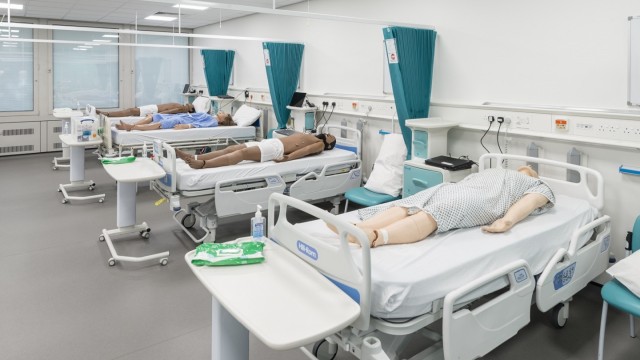
- Primary and Community Care SPQ District Nursing
PGDip — 2025 entry Primary and Community Care SPQ District Nursing
On this course, you’ll gain the knowledge and skills to become an exceptional and compassionate district nurse. You’ll work at an advanced level to deliver, lead and influence care for the benefit of the individual and community you serve.
Why choose
this course?
- Learn from experienced professionals who are experts in their respective fields and who will ensure that you receive high-quality education and mentorship.
- Benefit from our established partnerships with local healthcare institutions and community organisations, providing you with valuable clinical opportunities. You will gain hands-on experience and apply your learning in real-world settings under the supervision of experienced practice assessors and supervisors.
- Learn in a research-intensive environment, which may offer you opportunities to engage in cutting-edge research projects and contribute to the advancement of nursing knowledge and specialist practice.
- Meet the Nursing and Midwifery Council’s (NMC) standards for specialist education and practice and record your qualification with the NMC.
- Take advantage of Surrey’s reputation and strong connections within the healthcare sector, including with the Queen’s Nursing Institute, to enhance your career prospects.
Statistics
4th in the UK
For nursing and midwifery in the Postgraduate Taught Experience Survey 2023 (CAH3)
7th in the UK
For nursing in the QS World University Subject Rankings 2024
100%
Of graduates from our School of Health Sciences are in employment or further study (Graduate Outcomes 2024, HESA)



What you will study
On this course, you’ll study a comprehensive curriculum, which covers a wide range of topics relevant to community and district nursing practice. We will teach you how to deliver high-quality evidence-based care to individuals in the home environment and support carers, families and communities everywhere.
You will acquire the specialist knowledge, skills and attributes needed to work as a nurse in the community, where more autonomous decision-making is required. Achieving this qualification will give you greater clinical autonomy and encourage independent decision-making and leadership in complex and high-risk situations.
Professional recognition
PGDip - Nursing and Midwifery Council (NMC)
Recognised by the Nursing and Midwifery Council (NMC) as a post-registration and CPD qualification.
Sponsorship
Applications should initially be made via NHS jobs for sponsored places on the course. If you are interested in self-funding for this course, please contact the programme leader for further information.
Clinical placements
You’ll spend half of your training in clinical placements, allowing you to develop your knowledge and skills within healthcare settings. Theory and practice are integrated throughout the course and a balance of learning opportunities is provided. Your learning will be supported by a named practice supervisor, practice assessor and academic assessor. Your practice placement will be organised by your employing/hosting NHS community organisation.
You can choose to complete this course full-time over one year or part-time over two years.
The structure of our programmes follows clear educational aims that are tailored to each programme. These are all outlined in the programme specifications which include further details such as the learning outcomes:
Modules
Modules listed are indicative, reflecting the information available at the time of publication. Modules are subject to teaching availability, student demand and/or class size caps.
The University operates a credit framework for all taught programmes based on a 15-credit tariff, meaning all modules are comprised of multiples of 15 credits, up to a maximum of 120 credits.
Course options
Year 1
Semester 1
Core
The module will enable the students to critically examine the key concepts of public health and health promotion. Students will develop knowledge and skills in accessing and analysing data to enable them to identify health inequalities and health needs. Students will debate how health promotion approaches and interventions can address contemporary public health issues that support people and communities to meet their health optimum.
View full module detailsThis module supports students in critically enhancing their knowledge, skills and understanding to support person-centred service development for babies, children, young people and adults with long-term conditions and their families/carers living with long-term condition(s). It will enable students to understand the challenges and complexities of living with a long-term condition and maximise routine practices, strategies and interventions used to support people to self-manage their illness. Central to this module is the significance of using evidence-based approaches to manage long-term conditions and to understand this in the context of contemporary health and social care practice. The module will be facilitated using an enquiry-based learning approach with keynote lectures from relevant health and social care professionals.
View full module detailsSemester 2
Core
The module enables students to understand the theoretical and practical aspects of research; how to design research informed by theoretical, methodological and practical issues; and how to prepare a research proposal relevant to health and social care practice. The module provides students with the knowledge, skills and confidence in planning and writing a research proposal that can be taken forward to the dissertation module.
View full module detailsThis module encourages learners to reflect on their own practice and development to consider leadership theories and literature in response to a changing healthcare landscape. To cultivate healthcare leaders who possess a comprehensive critical understanding of ethical leadership, using advanced cognitive and practical skills to promote equitable practice, demonstrating the ability to create positive learning cultures within interdisciplinary teams, fostering a commitment to equity, diversity, and inclusion in healthcare settings.
View full module detailsThis module aims to enable healthcare practitioners working in specialist and/or advanced roles to significantly expand their knowledge of pharmacology, related clinical sciences and the practice of medicines optimisation.
View full module detailsOptional
This module is aimed at health care practitioners who work with people who are in pain. Students will be introduced to theories of pain and evaluate pain assessment tools taking a holistic approach. They will develop knowledge of pharmacological and non-pharmacological approaches to pain management. These will be set in the context of current national and international issues in pain management. Students will be encouraged to critically evaluate their clinical skills and to use evidence-based methods to develop practice.
View full module detailsThis module will explore the role of decision making within the healthcare environment. It will support students' exploration of their understanding and knowledge of the theory underpinning decision making, judgement and human factors within healthcare, and the potential influential factors including; policy, risk, finances, ethics, the environment, shared decision-making, and the actual and potential consequences of the decision.
View full module detailsSemester 1 & 2
Core
This module empowers health and social care professionals to examine the factors contributing to workplace safety and the care of patients/service users, considering the influence of human factors on safety. Additionally, the module encourages students to critically assess the interplay between national patient safety policies and their impact on local guidelines and policies. Moreover, students will cultivate a critical understanding of the intricate legal and ethical issues affecting patient safety. They will also scrutinise the role of accountability in effectively managing safety and risk in the workplace.
View full module detailsAcross academic years
Core
This module will blend critical comprehension of evidence-based theory with the acquisition of practical skills essential for effective practice as a Specialist Practitioner in primary and community care settings. Students will gain the skills to undertake comprehensive health assessments encompassing multiple body systems, using their findings to formulate a differential diagnosis. Furthermore, they will employ the consultation process to evaluate a patient's healthcare requirements and formulate a comprehensive care plan.
View full module detailsOptional modules for Year 1 - FHEQ Level 7
Students must select either Holistic Pain Management or Application of Decision Making
Year 2
Semester 1
Core
This module supports students in critically enhancing their knowledge, skills and understanding to support person-centred service development for babies, children, young people and adults with long-term conditions and their families/carers living with long-term condition(s). It will enable students to understand the challenges and complexities of living with a long-term condition and maximise routine practices, strategies and interventions used to support people to self-manage their illness. Central to this module is the significance of using evidence-based approaches to manage long-term conditions and to understand this in the context of contemporary health and social care practice. The module will be facilitated using an enquiry-based learning approach with keynote lectures from relevant health and social care professionals.
View full module detailsSemester 2
Core
This module aims to enable healthcare practitioners working in specialist and/or advanced roles to significantly expand their knowledge of pharmacology, related clinical sciences and the practice of medicines optimisation.
View full module detailsOptional
This module is aimed at health care practitioners who work with people who are in pain. Students will be introduced to theories of pain and evaluate pain assessment tools taking a holistic approach. They will develop knowledge of pharmacological and non-pharmacological approaches to pain management. These will be set in the context of current national and international issues in pain management. Students will be encouraged to critically evaluate their clinical skills and to use evidence-based methods to develop practice.
View full module detailsThis module will explore the role of decision making within the healthcare environment. It will support students' exploration of their understanding and knowledge of the theory underpinning decision making, judgement and human factors within healthcare, and the potential influential factors including; policy, risk, finances, ethics, the environment, shared decision-making, and the actual and potential consequences of the decision.
View full module detailsAcross academic years
Core
This module empowers health and social care professionals to examine the factors contributing to workplace safety and the care of patients/service users, considering the influence of human factors on safety. Additionally, the module encourages students to critically assess the interplay between national patient safety policies and their impact on local guidelines and policies. Moreover, students will cultivate a critical understanding of the intricate legal and ethical issues affecting patient safety. They will also scrutinise the role of accountability in effectively managing safety and risk in the workplace.
View full module detailsOptional modules for Year 2 (Part-Time) - FHEQ Level 7
Students must select either Holistic Pain Management or Application of Decision Making
Year 1
Semester 1
Core
The module will enable the students to critically examine the key concepts of public health and health promotion. Students will develop knowledge and skills in accessing and analysing data to enable them to identify health inequalities and health needs. Students will debate how health promotion approaches and interventions can address contemporary public health issues that support people and communities to meet their health optimum.
View full module detailsSemester 2
Core
The module enables students to understand the theoretical and practical aspects of research; how to design research informed by theoretical, methodological and practical issues; and how to prepare a research proposal relevant to health and social care practice. The module provides students with the knowledge, skills and confidence in planning and writing a research proposal that can be taken forward to the dissertation module.
View full module detailsThis module encourages learners to reflect on their own practice and development to consider leadership theories and literature in response to a changing healthcare landscape. To cultivate healthcare leaders who possess a comprehensive critical understanding of ethical leadership, using advanced cognitive and practical skills to promote equitable practice, demonstrating the ability to create positive learning cultures within interdisciplinary teams, fostering a commitment to equity, diversity, and inclusion in healthcare settings.
View full module detailsSemester 1 & 2
Core
This module will blend critical comprehension of evidence-based theory with the acquisition of practical skills essential for effective practice as a Specialist Practitioner in primary and community care settings. Students will gain the skills to undertake comprehensive health assessments encompassing multiple body systems, using their findings to formulate a differential diagnosis. Furthermore, they will employ the consultation process to evaluate a patient's healthcare requirements and formulate a comprehensive care plan.
View full module detailsOptional modules for Year 1 (Part-Time) - FHEQ Level 7
Students must select either Holistic Pain Management or Application of Decision Making
Teaching and learning
Your teaching will be delivered through a combination of:
- Lectures
- Group work
- Simulation
- Online learning
- Role play
- Specialty-focused tutorial groups
- Profession-led case studies / scenarios
- Learning sets.
AssessmentWe use a variety of methods to assess you, including assessment in practice by your practice assessor and practice supervisor.
Check individual module information for further details.
General course information
Contact hours
Contact hours can vary across our modules. Full details of the contact hours for each module are available from the University of Surrey's module catalogue. See the modules section for more information.
Timetable
Course timetables are normally available one month before the start of the semester.
New students will receive their personalised timetable in Welcome Week, and in subsequent semesters, two weeks prior to the start of semester.
Please note that while we make every effort to ensure that timetables are as student-friendly as possible, scheduled teaching can take place on any day of the week (Monday – Friday). Wednesday afternoons are normally reserved for sports and cultural activities. Part-time classes are normally scheduled on one or two days per week, details of which can be obtained from Academic Administration.
Location
Our Medicine (Graduate Entry) BMBS degree, nursing and midwifery, and health science courses are taught at the Kate Granger Building (30 Priestley Road), on the Surrey Research Park.
You’ll be expected to attend clinical placements with your NHS employer. Please see the Course details section for more information.
We use a variety of methods to assess you, including assessment in practice by your practice assessor and practice supervisor.
Check individual module information for further details.
Contact hours
Contact hours can vary across our modules. Full details of the contact hours for each module are available from the University of Surrey's module catalogue. See the modules section for more information.
Timetable
Course timetables are normally available one month before the start of the semester.
New students will receive their personalised timetable in Welcome Week, and in subsequent semesters, two weeks prior to the start of semester.
Please note that while we make every effort to ensure that timetables are as student-friendly as possible, scheduled teaching can take place on any day of the week (Monday – Friday). Wednesday afternoons are normally reserved for sports and cultural activities. Part-time classes are normally scheduled on one or two days per week, details of which can be obtained from Academic Administration.
Location
Our Medicine (Graduate Entry) BMBS degree, nursing and midwifery, and health science courses are taught at the Kate Granger Building (30 Priestley Road), on the Surrey Research Park.
You’ll be expected to attend clinical placements with your NHS employer. Please see the Course details section for more information.
We offer careers information, advice and guidance to all students whilst studying with us, which is extended to our alumni for three years after leaving the University.
100% of postgraduate taught graduates from our School of Health Sciences are in employment or further study (Graduate Outcomes 2024, HESA).
On completion of the course, you will gain the NMC recordable qualification of Community Nursing SPQ District Nursing.
Visit the Queen’s Nursing Institute website and the Association of District Nurse & Community Nurse Educators website for more information on community and district nursing.
For information on careers and nursing roles, visit the NHS careers website.
You’ll benefit from our multimillion-pound facilities, including our lecture theatres and seminar rooms, designed to promote knowledge exchange and networking with other healthcare professionals.
UK qualifications
A minimum of a 2:2 in a relevant UK honours degree. Students who have a Diploma in Higher Education or a bachelor's degree with a lower grade may be considered using the Advanced Standing process to support their application.
Applicants must also be a NMC registered nurse (level 1) with relevant professional registration, capable of safe and effective practice at the level of proficiency appropriate to the NMC approved community nursing specialist practice qualification (SPQ) programme before being considered as eligible to apply for entry.
English language requirements
IELTS Academic: 7.0 overall with 6.5 in each element.
These are the English language qualifications and levels that we can accept.
If you do not currently meet the level required for your programme, we offer intensive pre-sessional English language courses, designed to take you to the level of English ability and skill required for your studies here.
Scholarships and bursaries
Discover what scholarships and bursaries are available to support your studies.
Course fees
This course is normally conducted as a fully-funded placement through our partnered NHS trusts, and as such has no tuition fee costs to the student.
If you would be self-funding, please contact postreg_admin@surrey.ac.uk for information regarding the fees.
How to apply
Applications should initially be made via NHS jobs.
Eligible applicants will be given further information on how to submit an application to the University following a successful interview with the Trust. If you have any questions please email admissions@surrey.ac.uk.
Admissions information
Once you apply, you can expect to hear back from us within 14 days. This might be with a decision on your application or with a request for further information.
Our code of practice for postgraduate admissions policy explains how the Admissions team considers applications and admits students. Read our postgraduate applicant guidance for more information on applying.
About the University of Surrey
Need more information?
Contact our Admissions team or talk to a current University of Surrey student online.
Terms and conditions
When you accept an offer to study at the University of Surrey, you are agreeing to follow our policies and procedures, student regulations, and terms and conditions.
We provide these terms and conditions in two stages:
- First when we make an offer.
- Second when students accept their offer and register to study with us (registration terms and conditions will vary depending on your course and academic year).
View our generic registration terms and conditions (PDF) for the 2024/25 academic year, as a guide on what to expect.
Disclaimer
This online prospectus has been published in advance of the academic year to which it applies.
Whilst we have done everything possible to ensure this information is accurate, some changes may happen between publishing and the start of the course.
It is important to check this website for any updates before you apply for a course with us. Read our full disclaimer.








